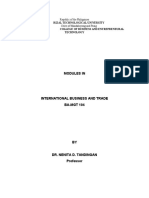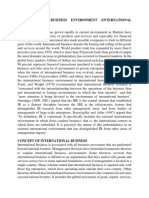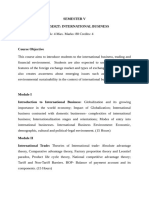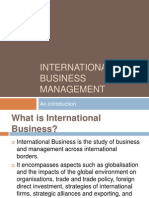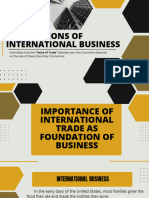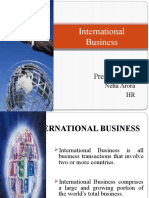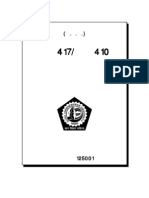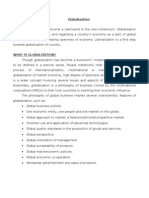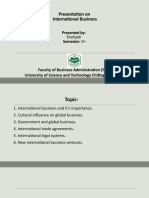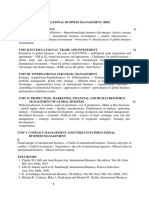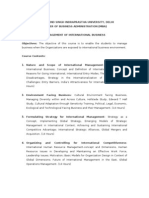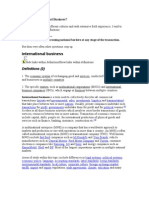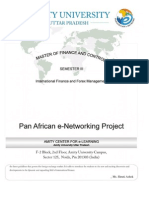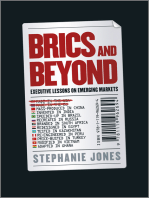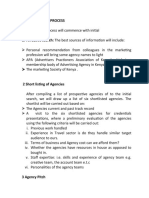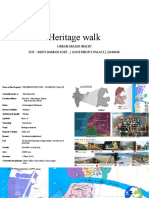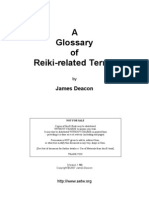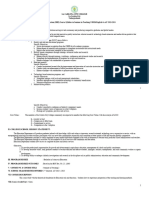0 ratings0% found this document useful (0 votes)
117 viewsBisnis Internasional: Dosen Pengampu: Dr. Imam Suyadi, DRS, Msi HP: 081 252 98 742 Email
Bisnis Internasional: Dosen Pengampu: Dr. Imam Suyadi, DRS, Msi HP: 081 252 98 742 Email
Uploaded by
Raka W DharmawanThis document outlines the course plan for an international business class, including topics that will be covered each week such as international trade theories, foreign investment, and cultural challenges in international business. It also provides an introduction to some of the challenges of international business, defining it as commercial transactions between countries, and explaining why companies pursue international opportunities such as expanding sales and diversifying supply sources. The document emphasizes the importance of studying international business due to the growing globalization of markets and interconnectedness of the world economy.
Copyright:
Attribution Non-Commercial (BY-NC)
Available Formats
Download as PPTX, PDF, TXT or read online from Scribd
Bisnis Internasional: Dosen Pengampu: Dr. Imam Suyadi, DRS, Msi HP: 081 252 98 742 Email
Bisnis Internasional: Dosen Pengampu: Dr. Imam Suyadi, DRS, Msi HP: 081 252 98 742 Email
Uploaded by
Raka W Dharmawan0 ratings0% found this document useful (0 votes)
117 views14 pagesThis document outlines the course plan for an international business class, including topics that will be covered each week such as international trade theories, foreign investment, and cultural challenges in international business. It also provides an introduction to some of the challenges of international business, defining it as commercial transactions between countries, and explaining why companies pursue international opportunities such as expanding sales and diversifying supply sources. The document emphasizes the importance of studying international business due to the growing globalization of markets and interconnectedness of the world economy.
Original Title
Per Dana
Copyright
© Attribution Non-Commercial (BY-NC)
Available Formats
PPTX, PDF, TXT or read online from Scribd
Share this document
Did you find this document useful?
Is this content inappropriate?
This document outlines the course plan for an international business class, including topics that will be covered each week such as international trade theories, foreign investment, and cultural challenges in international business. It also provides an introduction to some of the challenges of international business, defining it as commercial transactions between countries, and explaining why companies pursue international opportunities such as expanding sales and diversifying supply sources. The document emphasizes the importance of studying international business due to the growing globalization of markets and interconnectedness of the world economy.
Copyright:
Attribution Non-Commercial (BY-NC)
Available Formats
Download as PPTX, PDF, TXT or read online from Scribd
Download as pptx, pdf, or txt
0 ratings0% found this document useful (0 votes)
117 views14 pagesBisnis Internasional: Dosen Pengampu: Dr. Imam Suyadi, DRS, Msi HP: 081 252 98 742 Email
Bisnis Internasional: Dosen Pengampu: Dr. Imam Suyadi, DRS, Msi HP: 081 252 98 742 Email
Uploaded by
Raka W DharmawanThis document outlines the course plan for an international business class, including topics that will be covered each week such as international trade theories, foreign investment, and cultural challenges in international business. It also provides an introduction to some of the challenges of international business, defining it as commercial transactions between countries, and explaining why companies pursue international opportunities such as expanding sales and diversifying supply sources. The document emphasizes the importance of studying international business due to the growing globalization of markets and interconnectedness of the world economy.
Copyright:
Attribution Non-Commercial (BY-NC)
Available Formats
Download as PPTX, PDF, TXT or read online from Scribd
Download as pptx, pdf, or txt
You are on page 1of 14
BISNIS INTERNASIONAL
Dosen Pengampu:
DR. IMAM SUYADI, DRS, MSi
Hp: 081 252 98 742
eMail:
imamyadi@gmail.com
http://mail.ub.ac.id imam_s_fia
KULIAH 1. PENDAHULUAN
• RENCANA PROGRAM & KEGIATAN PEMBELAJARAN
SEMESTER (RPKPS)
• TANTANGAN DALAM BISNIS INTERASIONAL
RENCANA PROGRAM & KEGIATAN
PEMBELAJARAN SEMESTER (RPKPS) - 1
1. Tantangan dalam Bisnis internasional
2. Teori perdagangan internasional
3. Investasi internasional dan bantuan Luar Negeri
4. Neraca pembayaran dan sistem moneter
internasional
5. Integrasi ekonomi dan moneter
6. Tantangan budaya dalam Bisnis internasinal
7. Pemerintah, Hukum, dan Resiko Politik dalam bisnis
internasional
8. Ujian tengah semester (UTS)
RENCANA PROGRAM & KEGIATAN
PEMBELAJARAN SEMESTER (RPKPS) - 2
9. Memasuki pasar internasional
10. Pemasaran internasional
11. Perencanaan Strategi Global
12. Akuntansi keuangan dan perpajakan internasional
13. Strategi HRM internasional
14. Manajemen operasional internasional
15. Prespektif global Indonesia dalam Bisnis
Internasional
16. Ujian akhir semester (UAS)
Pustaka :
Marios i. Katsioloudes and Spyros Hadjidakis, International Business, Global Prespective, ELSEVIER-BH,
Amsterdam, 2007
Artikel-artikel International Business :
• INTERNATIONAL BUSINESS AND EUROPE IN TRANSITION (Volume 1) Edited by Fred Burton, Mo Yamin and
Stephen Young
• INTERNATIONALIZATION STRATEGIES (Volume 2) Edited by George Chryssochoidis, Carla Millar and Jeremy
Clegg
• THE STRATEGY AND ORGANIZATION OF INTERNATIONAL BUSINESS (Volume 3) Edited by Peter Buckley, Fred
Burton and Hafiz Mirza
• INTERNATIONALIZATION: PROCESS, CONTEXT AND MARKETS (Volume 4) Edited by Graham Hooley, Ray
Loveridge and David Wilson
• INTERNATIONAL BUSINESS ORGANIZATION: SUBSIDIARY MANAGEMENT, ENTRY STRATEGIES AND EMERGING
MARKETS (Volume 5) Edited by Fred Burton, Malcolm Chapman and Adam Cross
• INTERNATIONAL BUSINESS: EMERGING ISSUES AND EMERGING MARKETS (Volume 6) Edited by Carla C. J. M.
Millar, Robert M. Grant and Chong Ju Choi
• INTERNATIONAL BUSINESS: EUROPEAN DIMENSIONS (Volume 7) Edited by Michael D. Hughes and James H.
Taggart
• MULTINATIONALS IN A NEW ERA: INTERNATIONAL STRATEGY AND MANAGEMENT (Volume 8) Edited by
James H. Taggart, Maureen Berry and Michael McDermott
• INTERNATIONAL BUSINESS: ADJUSTING TO NEW CHALLENGES AND OPPORTUNITIES (Volume 9) Edited by
Frank McDonald, Heinz Tüselmann and Colin Wheeler
TANTANGAN DALAM BISNIS INTERASIONAL
Kemampuan akhir yang diharapkan, mahasiswa mampu:
• Memahami bisnis dunia sekarang
• Mendefinisikan bisnis internasional
• Memahami mengapa perusahaan go internasional
• Menyebutkan peserta - peserta bisnis internasional
• Menjelaskan prespektif global bisnis internasional
• Menjelaskan mengapa diperlukan studi tentang bisnis
internasional
TANTANGAN DALAM BISNIS INTERASIONAL
Memahami bisnis dunia sekarang
International business differs from domestic business by
degrees. Although laws, cultures, and economic
conditions differ within countries, such differences are
usually less marked than those among countries. Even
though there are limitations on the movement of goods
and services and the resources to produce them within
countries, these limitations are usually less pronounced
within than among countries.
TANTANGAN DALAM BISNIS INTERASIONAL
Mendefinisikan bisnis internasional
what is international business?
International business is all commercial transactions—
private and governmental between two or more
countries. Private companies undertake such transactions
for profit; governments may or may not do the same in
their transactions. These transactions include sales,
investments, and transportationMarios i. (Katsioloudes
and Spyros Hadjidakis, 2007).
TANTANGAN DALAM BISNIS INTERASIONAL
Another definition of “international business” refers to profit-
related activities conducted across national boundaries. The
environment for those business activities within which the
international manager functions is shaped by major developments in
the world.
Such developments are globalization; the various regional trading
blocs such as the European Union with the introduction of the Euro
as its legally tradable currency; the North American Free Trade
Agreement (NAFTA); the Commonwealth of Independent States
(CIS); information technology; workforce diversity; the status of the
emerging economies of China, India, Mexico and Brazil; and the
unstable political situation in various parts of the world, such as the
one in Afghanistan, the Middle East, and in various parts of Africa.
TANTANGAN DALAM BISNIS INTERASIONAL
• Memahami mengapa perusahaan go internasional
When operating internationally, a company should consider its
mission (what it will seek to do and become over the years;
what is the purpose of the company’s existence?); its objectives
(what is the company trying to accomplish according to its
mission?); and strategies (means to achieve its objectives).
These concepts will be further addressed in Chapter 7.
Companies engage in international business in order to:
• Minimize competitive risk
• Acquire resources
• Expand sales
• Diversify sources of sales and supplies
TANTANGAN DALAM BISNIS INTERASIONAL
Menyebutkan peserta - peserta bisnis internasional
Companies of all types and sizes, and in all types of
industries, enter into international business transactions.
Manufacturing companies, service companies, and retail
companies all search for customers outside their
countries. As mentioned earlier, an international
company is a business that engages directly in any form
of international business activity such as exporting,
importing, or international production. No matter what
the nature of the international business transactions,
there are different types of international companies, and
we will take a closer look at them in the following pages.
TANTANGAN DALAM BISNIS INTERASIONAL
Menjelaskan prespektif global bisnis internasional
People around the globe are more connected to
each other than ever before. Information and money
too flow more quickly than ever before. Goods and
services produced in one part of the world are
increasingly available in all parts of the world.
International communication is commonplace. This
phenomenon has been titled “globalization.” The era
of globalization is fast
• becoming the preferred term for describing the
current times.
TANTANGAN DALAM BISNIS INTERASIONAL
Menjelaskan mengapa diperlukan studi tentang bisnis
internasional?
Why should we study international business?
A simple answer is that international business comprises a large
and growing portion of the world’s total business.
Today, global events and competition affect almost all compa-nies
—large or small—because most sell output to and secure supplies
from foreign countries. Many companies also compete against
products and services that transactions among countries.
Exhibit 1.1 indicates the leading exporters and importers in world
merchandize trade by region. More on culture and its impact on
international business will be addressed in Chapter 2. The section
below addresses definitional issues of international
business.
Review and Discussion Questions
1. What is the nature of today’s global business environment? How does this
environment facilitate international business activities? Provide examples.
2. How do the legal–political, economic, and cultural environmental differences within a
country affect a firm’s international business transactions? Provide examples.
3. What is international business? How does the management of an international
business differ from that of a domestic one? Provide examples with specific firms and
countries in mind
4. Provide the reasons as to why companies go international. What additional factors
contribute to the increased international business activities in the recent years?
5. Who are the participants in the international business?
6. Why do small businesses become increasingly active in international trade and
investment? Provide examples.
7. How do multinational corporations—MNCs—get involved in international business?
How do they differ from small businesses?
8. Define globalization. What are the pros and cons of globalization? Provide examples.
9. What is the globalization of markets? Of production? Provide examples.
10. Why do we study international business? Why has studying it become more important
today than ever before?
You might also like
- Stephanopoulos' Chemical Process Control - An Introduction To Theory & Practice - Solutions ManualDocument177 pagesStephanopoulos' Chemical Process Control - An Introduction To Theory & Practice - Solutions ManualShafi Marwat Khan100% (3)
- International Business: Environments & OperationsFrom EverandInternational Business: Environments & OperationsRating: 5 out of 5 stars5/5 (1)
- 2.5ME Kahuna CF Install Manual Issue 4.3 Rev 3Document79 pages2.5ME Kahuna CF Install Manual Issue 4.3 Rev 3muthu0% (1)
- Transformer Lab ManualDocument68 pagesTransformer Lab ManualRolando Cruz100% (1)
- Introduction To International Marketing & Trade Black Book PDFDocument54 pagesIntroduction To International Marketing & Trade Black Book PDFarvind chauhanNo ratings yet
- International Business BUS 510 Session 1 Chapter 1 Introduction & Overview GlobalizationDocument22 pagesInternational Business BUS 510 Session 1 Chapter 1 Introduction & Overview GlobalizationKassaf ChowdhuryNo ratings yet
- International Business ManagemnetDocument12 pagesInternational Business ManagemnetPramod GowdaNo ratings yet
- C 5Document14 pagesC 5Quicksaber100% (1)
- Tutorial 1 - Ilogic Basic TutorialDocument33 pagesTutorial 1 - Ilogic Basic TutorialtungnhienNo ratings yet
- International Business Course OutlineDocument2 pagesInternational Business Course OutlineSheraz AhmadNo ratings yet
- Modules In: Rizal Technological University College of Business and Entrepreneural TechnologyDocument133 pagesModules In: Rizal Technological University College of Business and Entrepreneural TechnologySuello Andrea Mae DNo ratings yet
- DMGT545 International Business PDFDocument305 pagesDMGT545 International Business PDFNithyananda PatelNo ratings yet
- Bba 308Document55 pagesBba 308Rohi KirigaNo ratings yet
- Ib 1 - 2023Document12 pagesIb 1 - 2023cristinaNo ratings yet
- Modules in Internationa Business and TradeDocument133 pagesModules in Internationa Business and TradeCRISTINE JOY LAUZ100% (1)
- International Business EnvironmentDocument29 pagesInternational Business EnvironmentNardsdel RiveraNo ratings yet
- Study On IbDocument66 pagesStudy On Ibvishnudath709No ratings yet
- International BusinessDocument74 pagesInternational BusinessSamson HillsNo ratings yet
- Group 2 EcnDocument15 pagesGroup 2 EcnmelviejanezabalaNo ratings yet
- International Business ManagementDocument22 pagesInternational Business ManagementNainesh Mutha100% (1)
- International Business Trade ReviewerDocument8 pagesInternational Business Trade ReviewerCoffee VanillaNo ratings yet
- International Business ManagementDocument96 pagesInternational Business ManagementA vyasNo ratings yet
- Lesson 1 IBT 2023Document25 pagesLesson 1 IBT 2023bryvinsarmientoNo ratings yet
- Global BusinessDocument73 pagesGlobal Businessmanan chachraNo ratings yet
- International Business in Changing Global Environment: Ivica KatavićDocument13 pagesInternational Business in Changing Global Environment: Ivica KatavićShobhit ShuklaNo ratings yet
- I B PresentationDocument19 pagesI B PresentationAtul VermaNo ratings yet
- 635 International BusinessDocument2 pages635 International BusinessProf-Syed Ahsanul AlamNo ratings yet
- IB Project - HR - TYBBI - Roll No.44Document12 pagesIB Project - HR - TYBBI - Roll No.44Mita ParyaniNo ratings yet
- <!DOCTYPE HTML PUBLIC "-//W3C//DTD HTML 4.01 Transitional//EN" "http://www.w3.org/TR/html4/loose.dtd"> <HTML><HEAD><META HTTP-EQUIV="Content-Type" CONTENT="text/html; charset=iso-8859-1"> <TITLE>ERROR: The requested URL could not be retrieved</TITLE> <STYLE type="text/css"><!--BODY{background-color:#ffffff;font-family:verdana,sans-serif}PRE{font-family:sans-serif}--></STYLE> </HEAD><BODY> <H1>ERROR</H1> <H2>The requested URL could not be retrieved</H2> <HR noshade size="1px"> <P> While trying to process the request: <PRE> TEXT http://www.scribd.com/titlecleaner?title=International+Marketing.pdf HTTP/1.1 Host: www.scribd.com Proxy-Connection: keep-alive Accept: */* Origin: http://www.scribd.com X-CSRF-Token: 99b49d37cd6ea48c417003839ffcc5bb113e748b User-Agent: Mozilla/5.0 (Windows NT 6.1) AppleWebKit/537.22 (KHTML, like Gecko) Chrome/25.0.1364.29 Safari/537.22 X-Requested-With: XMLHttpRequest Referer: http://www.scribd.com/upload-document?archive_doc=18926113&metaDocument250 pages<!DOCTYPE HTML PUBLIC "-//W3C//DTD HTML 4.01 Transitional//EN" "http://www.w3.org/TR/html4/loose.dtd"> <HTML><HEAD><META HTTP-EQUIV="Content-Type" CONTENT="text/html; charset=iso-8859-1"> <TITLE>ERROR: The requested URL could not be retrieved</TITLE> <STYLE type="text/css"><!--BODY{background-color:#ffffff;font-family:verdana,sans-serif}PRE{font-family:sans-serif}--></STYLE> </HEAD><BODY> <H1>ERROR</H1> <H2>The requested URL could not be retrieved</H2> <HR noshade size="1px"> <P> While trying to process the request: <PRE> TEXT http://www.scribd.com/titlecleaner?title=International+Marketing.pdf HTTP/1.1 Host: www.scribd.com Proxy-Connection: keep-alive Accept: */* Origin: http://www.scribd.com X-CSRF-Token: 99b49d37cd6ea48c417003839ffcc5bb113e748b User-Agent: Mozilla/5.0 (Windows NT 6.1) AppleWebKit/537.22 (KHTML, like Gecko) Chrome/25.0.1364.29 Safari/537.22 X-Requested-With: XMLHttpRequest Referer: http://www.scribd.com/upload-document?archive_doc=18926113&metaNaren KirmaraNo ratings yet
- Group Summary GSLC Session 17-18: Created byDocument10 pagesGroup Summary GSLC Session 17-18: Created byJadenia Annabella ChandraNo ratings yet
- BCO DSE-02-Block-01Document44 pagesBCO DSE-02-Block-01sam andreasNo ratings yet
- Additional-Learning-Material GFEBDocument6 pagesAdditional-Learning-Material GFEBcharlenealvarez59No ratings yet
- Globalization Globalization Has Become A Catchword in The New Millennium.Document22 pagesGlobalization Globalization Has Become A Catchword in The New Millennium.kediaprernaNo ratings yet
- Mita Paryani: International Business ProjectDocument12 pagesMita Paryani: International Business ProjectSunny AhujaNo ratings yet
- Int Mkt-Final PaperDocument27 pagesInt Mkt-Final PaperDavid Köves100% (1)
- Chap 1 International BusinessDocument25 pagesChap 1 International BusinesssnehapingoliaNo ratings yet
- Place Between The Citizens and Corporate of Different Country"Document10 pagesPlace Between The Citizens and Corporate of Different Country"Aswini K KrishnamurthiNo ratings yet
- Cba 102 Prelim LecturesDocument10 pagesCba 102 Prelim LecturesguevarrarsmNo ratings yet
- 305-Int Fin-NotesDocument6 pages305-Int Fin-NotesRutik PatilNo ratings yet
- Presentation On International Business: Presented byDocument39 pagesPresentation On International Business: Presented bySadiya ShahjadiNo ratings yet
- Hoib 1Document2 pagesHoib 1tusbeeha.fatimaNo ratings yet
- International Business Lecture 1Document13 pagesInternational Business Lecture 1Lillian KobusingyeNo ratings yet
- IFM Notes 1Document108 pagesIFM Notes 1Suresh Varma SNo ratings yet
- Group 9 - Chapter 12 (12.1-12.4)Document22 pagesGroup 9 - Chapter 12 (12.1-12.4)Maria AngelNo ratings yet
- Lecture 3 - Introduction To International Business TradeDocument13 pagesLecture 3 - Introduction To International Business TradeCAMELLENo ratings yet
- Unit I International Business Management: Introduction, Concept, DefinitionDocument81 pagesUnit I International Business Management: Introduction, Concept, DefinitionAjab AhmadNo ratings yet
- Ibm - Full Unit NotesDocument158 pagesIbm - Full Unit NotesHaripriya VNo ratings yet
- International Business Reading MaterialDocument38 pagesInternational Business Reading MaterialvertexNo ratings yet
- Assignment On International BusinessDocument22 pagesAssignment On International BusinessRabiul Karim ShipluNo ratings yet
- Introduction To GlobalizationDocument6 pagesIntroduction To GlobalizationGiralph NikkoNo ratings yet
- International Business Management PDFDocument5 pagesInternational Business Management PDFNaman SethNo ratings yet
- 305 Ib Ibe NotesDocument67 pages305 Ib Ibe NotesDr. Rakesh BhatiNo ratings yet
- MIB For IPDocument210 pagesMIB For IPaditya_kpl588% (8)
- International Business: Introduction, Concept, DefinitionDocument34 pagesInternational Business: Introduction, Concept, DefinitionPrachi SharmaNo ratings yet
- What Is International Business?Document26 pagesWhat Is International Business?aditya aggarwalNo ratings yet
- International Business Management IntroductionDocument22 pagesInternational Business Management IntroductionHimanshu PalNo ratings yet
- MF 0015Document312 pagesMF 0015Aayush Singhal100% (1)
- Cavusgil CH01 RevisedDocument27 pagesCavusgil CH01 RevisedUmar SulemanNo ratings yet
- International BusinessDocument27 pagesInternational BusinessRizsNo ratings yet
- IFFM BookDocument188 pagesIFFM BookTs'epo MochekeleNo ratings yet
- Going Abroad 2014: How to understand foreign markets and do business around the globeFrom EverandGoing Abroad 2014: How to understand foreign markets and do business around the globeNo ratings yet
- Reforming the International Financial System for DevelopmentFrom EverandReforming the International Financial System for DevelopmentNo ratings yet
- Agency Selection Process HaandoutDocument4 pagesAgency Selection Process Haandoutmagdaline lengeleshiNo ratings yet
- Implementing A Multi-Domain System: Siemens Digital Industries SoftwareDocument9 pagesImplementing A Multi-Domain System: Siemens Digital Industries SoftwareOscar MendozaNo ratings yet
- Case StudyDocument4 pagesCase Studyrubayet123No ratings yet
- CV Okky Leonardy Tajjudin 2Document13 pagesCV Okky Leonardy Tajjudin 2aanNo ratings yet
- The Effect of Pressuremeter Geometry On The Results of Tests in ClayDocument11 pagesThe Effect of Pressuremeter Geometry On The Results of Tests in Claycepi herdiyanNo ratings yet
- Condenser Tube Leak PresentationDocument5 pagesCondenser Tube Leak Presentationswccramas54No ratings yet
- OM3 CH 03 Measuring Performance in OperationsDocument15 pagesOM3 CH 03 Measuring Performance in OperationsGanessa Roland100% (2)
- LOG Internal Audit Check SheetDocument11 pagesLOG Internal Audit Check SheetlovableharryNo ratings yet
- Caie As Level Geography 9696 Core Physical Geography v2Document18 pagesCaie As Level Geography 9696 Core Physical Geography v2kgethilwemakgotsoNo ratings yet
- Retaining Wall Design - by Pillai & Menon PDFDocument23 pagesRetaining Wall Design - by Pillai & Menon PDFSaurabh SinghNo ratings yet
- La Misma Luna: A Love Story With A Happy EndingDocument3 pagesLa Misma Luna: A Love Story With A Happy EndingNátasha FernándezNo ratings yet
- Urban Insert Fort AreaDocument29 pagesUrban Insert Fort AreaAthira NairNo ratings yet
- Lesson 02. Handouts - Answer KeyDocument5 pagesLesson 02. Handouts - Answer KeyYassine BouzekriNo ratings yet
- Reiki GlossaryDocument29 pagesReiki Glossaryapi-26426838100% (1)
- Reading Is The Inhale Writing Is The ExhaleDocument2 pagesReading Is The Inhale Writing Is The ExhaleIsabela Act CisNo ratings yet
- Seminar On Teaching Syllabus BSED English 4ADocument7 pagesSeminar On Teaching Syllabus BSED English 4AMonica Benitez RicoNo ratings yet
- The Invisible Helpers - Charles W LeadbeaterDocument138 pagesThe Invisible Helpers - Charles W LeadbeaterStella Cobb100% (1)
- WORKSHOP. REVIEWER - FinalDocument14 pagesWORKSHOP. REVIEWER - FinalKamille NayraNo ratings yet
- What Is A Load Cell Circuit A Complete GuideDocument7 pagesWhat Is A Load Cell Circuit A Complete GuidejackNo ratings yet
- 4 Android Toast and Dialog PDFDocument16 pages4 Android Toast and Dialog PDFMark D. FelicianoNo ratings yet
- SQUI00101 - Technical Offer R2Document17 pagesSQUI00101 - Technical Offer R2Tarik KhanNo ratings yet
- Budget and Budgetary Control Literature ReviewDocument7 pagesBudget and Budgetary Control Literature Reviewafmzsprjlerxio100% (1)
- Project Profile On LED Based Lighting System PDFDocument8 pagesProject Profile On LED Based Lighting System PDFsambhudharmadevanNo ratings yet
- Failure of The Omai Tailings DamDocument17 pagesFailure of The Omai Tailings DamAnonymous oKnkKXjYTNNo ratings yet
- Nonlinear Equation Graphs - Level 3-4Document10 pagesNonlinear Equation Graphs - Level 3-4baobinh341102No ratings yet










